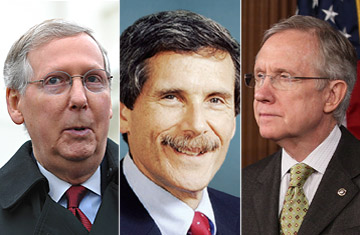
From left: Mitch McConnell (R., Ky.); Alan Frumin; Harry Reid (D., Nev.)
As Democrats try to salvage health care reform, there is one man who above all others will help determine its fate, and he is not Barack Obama or Harry Reid or even a member of Congress. In fact, odds are you've never heard of Alan Frumin, the Senate parliamentarian. But when it comes to the complex budgetary procedure known as reconciliation, the filibuster-proof process which Democrats hope to use to make certain fixes to the Senate bill, Frumin is "the defense counsel, he's the prosecution, he's the judge, he's the jury and he's the hangman," says Senator Judd Gregg of New Hampshire, the top Republican on the Budget Committee.
It will be up to Frumin to decide what parts of the previously passed Senate health care bill Senate Democrats can and cannot amend with a simple majority of 51 votes. House Democrats, who are being asked to pass a Senate bill with which they have some real disagreements, are counting on their Senate colleagues to make a certain number of tweaks after the fact, but that is no easy task.
The problem in using reconciliation is twofold: 1) it's open to amendments and many Republicans Senators, including Tom Coburn of Oklahoma, say they plan on filing hundreds of amendments, potentially gumming up the Senate for months; and 2) under a provision known as the Byrd rule — named after Senator Robert Byrd of West Virginia — every provision passed through reconciliation must be deemed relevant to the underlying budget by the parliamentarian.
In years past, Byrd rule meetings have lasted weeks and even months. Negotiators, usually the parliamentarian and the secretaries of both parties, Lula Davis for the Democrats and Dave Schiappa for the Republicans, sit cloistered in the parliamentarian's tiny office off the Senate floor in sessions that have come to be called Byrd baths. The provisions and amendments they rule nongermane have likewise come to be called Byrd droppings.
Frumin, 63, is a graduate of Colgate University in upstate New York and Georgetown Law. He's worked for the parliamentarian's office since 1977, and starting four years after that, he and former parliamentarian Bob Dove have effectively rotated what must be one of the most thankless jobs on Capitol Hill. They kept switching off because various congressional leaders fired one or the other in frustration. Dove served under Republicans from 1981-87, when he was fired by Robert Byrd after Dems took control. Frumin ran things until 1995, when Dove was reinstated. He only lasted until 2001, when he was fired by Trent Lott over his advice on the budget resolution. Lott reinstalled Frumin — making him the only parliamentarian to be appointed by both parties — who then stuck to Dove's recommendations. "I've known Alan very well for a very long time," says Dove, who now teaches at George Washington University and practices law at Patton Boggs. "He's more than up for the job." Frumin, as is tradition for sitting parliamentarians, declined to be interviewed for this story.
Dove says the Dems' planned use of reconciliation is highly unusual. "I've never seen a two-bill strategy" where reconciliation is used to fix another piece of legislation, he says. "It's permissible, I've just never seen it." How busy Frumin will be will depend on how many amendments Republicans file. Dove's worst year for reconciliation was 1995, when he threw out more than 300 amendments, many related to a Medicaid block grant program Republicans were trying to ram through reconciliation. President Bill Clinton ended up vetoing that bill in part due to his opposition to the Medicaid changes.
Parliamentarians are a rare breed, says Norm Ornstein, a congressional scholar at the conservative American Enterprise Institute. "The Congressional Budget Office at times experiences the same position where the majority has an incredibly strong imperative and there's a lot of pressure. The difference is you can't fire the head of the CBO," Ornstein says. "Parliamentarians are unique unto themselves. They're steeped in Senate arcana. And their jobs depend on their integrity."
They often find themselves the Senate's punching bag; whenever an amendment is rejected or a ruling is made Senators know exactly whom to call. "The Parliamentarians have 100 bosses — pretty difficult to please all of them all of the time, in fact it is hard to please even one sometimes," says Davis, the Democrats' secretary. "So regardless of their decision, someone will not be pleased."
When it comes down to it, though, it is not the parliamentarians that make the final decision. Frumin's $170,000-a-year job is strictly advisory: he recommends, based on his expertise and the research done by his office on precedents, a course of action to whomever is presiding over the Senate — in formal votes this is the Vice President. But if the leaders choose to ignore the parliamentarian's advice, they do so at their own peril: rulings that aren't backed up are subject to challenge. "Whoever's in the chair does make the ultimate decision but that can be overruled by a vote of the members," says Senator Kent Conrad, chairman of the Budget Committee. "You're just not in a position where you can just do whatever you want."
Parliamentarians' loyalty is above all to the institution, however imperfect. When asked if he supports the filibuster and cloture, Dove quoted the advice passed on to him by his predecessor and that he passed on to Frumin: "The rules are perfect and if they're all changed, the rules are still all perfect."
—With reporting by Katy Steinmetz / Washington
